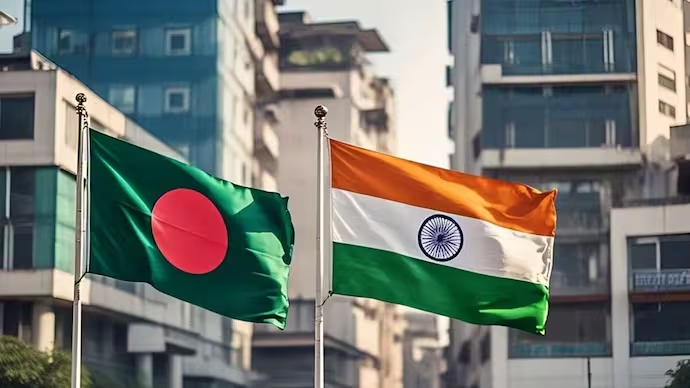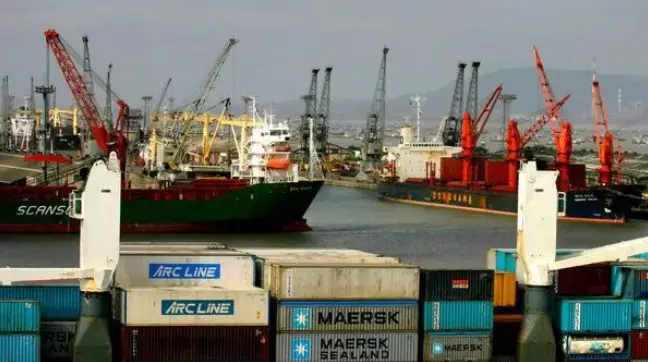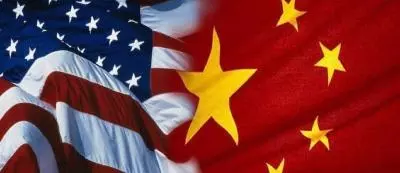
India halts Dhaka transshipment after Yunus’s Northeast remarks
text_fieldsNew Delhi: India has suspended the transshipment facility for Bangladesh’s export cargo in a significant move that follows controversial remarks made by Bangladesh’s Chief Adviser Muhammad Yunus during his recent visit to China. The move, announced on Tuesday through a notification issued by the Central Board of Indirect Taxes and Customs (CBIC), could severely impact Bangladesh’s trade with third countries.
The decision comes in the wake of Yunus’s comments advocating for the extension of the Chinese economy into India’s strategically sensitive Northeast region. Describing the landlocked Seven Sisters of eastern India as having no direct ocean access, Yunus had stated that Dhaka was the "only guardian of the ocean" for this region and suggested it could serve as a maritime gateway for Chinese trade and influence. His remarks were widely interpreted as an attempt to leverage Bangladesh’s geographic position to gain strategic advantage, a stance that drew sharp criticism from New Delhi and intensified diplomatic tensions between the two countries.
The Ministry of External Affairs (MEA)clarified the rationale behind the move, citing mounting logistical issues caused by the transshipment facility. MEA spokesperson Randhir Jaiswal said the arrangement had led to significant congestion at Indian ports and airports, delaying domestic exports and raising costs. “The facility has therefore been withdrawn with effect from April 8, 2025,” he said. “To clarify, these measures do not impact Bangladesh exports to Nepal or Bhutan that transit through Indian territory.”
Industry representatives welcomed the decision. Mithileshwar Thakur, Secretary General of the Apparel Export Promotion Council (AEPC), said it was a response to longstanding demands from Indian exporters. According to him, halting the transshipment of Bangladeshi cargo to third countries via Indian ports would help rationalize freight rates, reduce transportation costs for Indian exporters, and ease congestion at critical logistics hubs.
The CBIC’s notification officially rescinded the earlier circular dated June 29, 2020, which had permitted the transshipment of Bangladeshi export cargo to third countries through Indian Land Customs Stations (LCSs) en route to Indian ports and airports in sealed containers or trucks. The new circular has terminated this arrangement with immediate effect, although it allows cargo that has already entered Indian territory under the previous rules to complete its journey under existing procedures.
Ajay Srivastava, former trade officer and Head of the Global Trade Research Initiative (GTRI), pointed out that India has long supported Bangladesh’s trade interests. For over two decades, New Delhi has provided duty-free access to Bangladeshi goods—excluding alcohol and cigarettes—into the Indian market. However, he noted that Bangladesh’s recent overtures to China, including efforts to attract investment in strategic areas near India’s sensitive Siliguri Corridor, may have prompted India’s reassessment of the trade facilitation framework.
One such project includes Bangladesh’s proposal to develop the Lalmonirhat airbase near the Chicken’s Neck corridor, a narrow 22-kilometre stretch that connects India’s Northeast with the rest of the country. India sees the corridor as a strategic chokepoint and has consistently viewed any foreign interest in the region with caution.
Reacting strongly to Yunus’s remarks, Assam Chief Minister Himanta Biswa Sarma called them “offensive” and “strongly condemnable.” He said the statement highlighted the strategic vulnerabilities of India’s Northeast and emphasized the need for robust infrastructure to connect the region internally, including alternative routes that bypass the Siliguri Corridor.
The Northeast region shares a 1,596-kilometre-long international border with Bangladesh, 1,395 kilometres with China, 1,640 kilometres with Myanmar, 455 kilometres with Bhutan, and 97 kilometres with Nepal. However, its link to mainland India is limited to the narrow Chicken Neck, heightening its strategic significance.
While the government’s decision may help address domestic logistical concerns, Srivastava cautioned that it could raise questions about India’s commitments under international trade laws. Specifically, Article V of the General Agreement on Tariffs and Trade (GATT) 1994, under the World Trade Organization (WTO), mandates freedom of transit for goods to and from landlocked countries, without unnecessary delays or transit duties.
In addition, the WTO’s Trade Facilitation Agreement (TFA), particularly Article 11, reinforces these principles and calls for transparent procedures, streamlined inspections, and enhanced regional cooperation. The agreement also encourages member countries to adopt practical mechanisms, such as bonds or guarantees, to ease cross-border trade.
As the geopolitical dynamics in South Asia shift, India’s latest move marks a firm signal of its strategic priorities in the Northeast, even as it risks triggering fresh diplomatic friction with its eastern neighbour.
India has suspended the transshipment facility for Bangladesh’s export cargo in a significant move that follows controversial remarks made by Bangladesh’s Chief Adviser Muhammad Yunus during his recent visit to China. The move, announced on Tuesday through a notification issued by the Central Board of Indirect Taxes and Customs (CBIC), could severely impact Bangladesh’s trade with third countries.
The decision comes in the wake of Yunus’s comments advocating for the extension of the Chinese economy into India’s strategically sensitive Northeast region. Describing the landlocked Seven Sisters of eastern India as having no direct ocean access, Yunus had stated that Dhaka was the "only guardian of the ocean" for this region and suggested it could serve as a maritime gateway for Chinese trade and influence. His remarks were widely interpreted as an attempt to leverage Bangladesh’s geographic position to gain strategic advantage, a stance that drew sharp criticism from New Delhi and intensified diplomatic tensions between the two countries.
The Ministry of External Affairs (MEA), clarifying the rationale behind the move, cited mounting logistical issues caused by the transshipment facility. MEA spokesperson Randhir Jaiswal said the arrangement had led to significant congestion at Indian ports and airports, delaying domestic exports and raising costs. “The facility has therefore been withdrawn with effect from April 8, 2025,” he said. “To clarify, these measures do not impact Bangladesh exports to Nepal or Bhutan that transit through Indian territory.”
Industry representatives welcomed the decision. Mithileshwar Thakur, Secretary General of the Apparel Export Promotion Council (AEPC), said it was a response to longstanding demands from Indian exporters. According to him, halting the transshipment of Bangladeshi cargo to third countries via Indian ports would help rationalize freight rates, reduce transportation costs for Indian exporters, and ease congestion at critical logistics hubs.
The CBIC’s notification officially rescinded the earlier circular dated June 29, 2020, which had permitted the transshipment of Bangladeshi export cargo to third countries through Indian Land Customs Stations (LCSs) en route to Indian ports and airports in sealed containers or trucks. The new circular has terminated this arrangement with immediate effect, although it allows cargo that has already entered Indian territory under the previous rules to complete its journey under existing procedures.
Ajay Srivastava, former trade officer and Head of the Global Trade Research Initiative (GTRI), pointed out that India has long supported Bangladesh’s trade interests. For over two decades, New Delhi has provided duty-free access to Bangladeshi goods—excluding alcohol and cigarettes—into the Indian market. However, he noted that Bangladesh’s recent overtures to China, including efforts to attract investment in strategic areas near India’s sensitive Siliguri Corridor, may have prompted India’s reassessment of the trade facilitation framework.
One such project includes Bangladesh’s proposal to develop the Lalmonirhat airbase near the Chicken’s Neck corridor, a narrow 22-kilometre stretch that connects India’s Northeast with the rest of the country. India sees the corridor as a strategic chokepoint and has consistently viewed any foreign interest in the region with caution.
Reacting strongly to Yunus’s remarks, Assam Chief Minister Himanta Biswa Sarma called them “offensive” and “strongly condemnable.” He said the statement highlighted the strategic vulnerabilities of India’s Northeast and emphasized the need for robust infrastructure to connect the region internally, including alternative routes that bypass the Siliguri Corridor.
The Northeast region shares a 1,596-kilometre-long international border with Bangladesh, 1,395 kilometres with China, 1,640 kilometres with Myanmar, 455 kilometres with Bhutan, and 97 kilometres with Nepal. However, its link to mainland India is limited to the narrow Chicken Neck, heightening its strategic significance.
While the government’s decision may help address domestic logistical concerns, Srivastava cautioned that it could raise questions about India’s commitments under international trade laws. Specifically, Article V of the General Agreement on Tariffs and Trade (GATT) 1994, under the World Trade Organization (WTO), mandates freedom of transit for goods to and from landlocked countries, without unnecessary delays or transit duties.
In addition, the WTO’s Trade Facilitation Agreement (TFA), particularly Article 11, reinforces these principles and calls for transparent procedures, streamlined inspections, and enhanced regional cooperation. The agreement also encourages member countries to adopt practical mechanisms, such as bonds or guarantees, to ease cross-border trade.
As the geopolitical dynamics in South Asia shift, India’s latest move marks a firm signal of its strategic priorities in the Northeast, even as it risks triggering fresh diplomatic friction with its eastern neighbour.



























